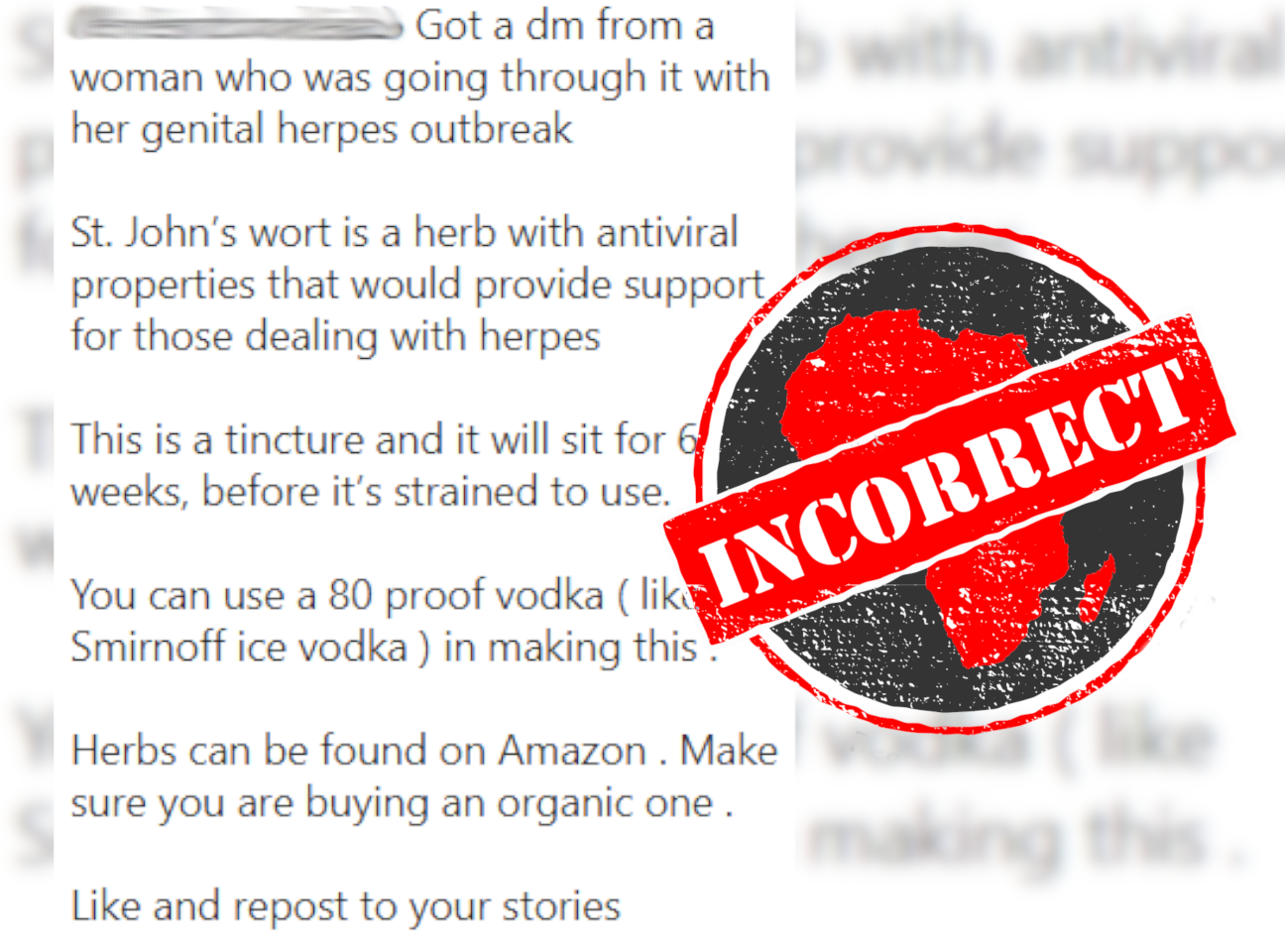“Got a dm from a woman who was going through it with her genital herpes outbreak,” begins a message on Instagram.
It then gives a cure: St John’s wort and alcohol.
“St. John’s wort is a herb with antiviral properties that would provide support for those dealing with herpes,” it reads.
“This is a tincture and it will sit for 6 weeks, before it’s strained to use. You can use a 80 proof vodka ( like Smirnoff ice vodka ) in making this.” The message includes a video showing how to make the mixture.

What is herpes?
Herpes is an infection caused by the herpes simplex virus. There are two types of the virus. HSV-1 causes oral herpes, with symptoms such as cold sores, and is transmitted from mouth to mouth contact.
Genital herpes is caused by the HSV- 2 herpes virus, although it can also be caused by HSV-1. Once you have herpes you will have it for life, but both types usually don’t show any symptoms.
The UK’s National Health System says that when symptoms of genital herpes do appear, they can include “small blisters that burst to leave red, open sores around your genitals, anus, thighs or bottom; tingling, burning or itching around your genitals; pain when you pee” and, in women, an unusual vaginal discharge.
Untreated herpes symptoms can put people at greater risk of HIV infection.
St John’s wort (scientific name Hypericum perforatum) is a plant native to Europe that grows in the wild. It has long been used as a treatment for depression. But experts caution that it can weaken the effectiveness of prescription medicines, such as those for HIV and cancer.
Will St John’s wort steeped in alcohol really cure genital herpes?
Avoid heat and don’t douche
“A mixture of St John's wort and vodka has not been proven to treat herpes,” Dr Olajumoke Ogunro, a gynaecologist at the Alpha Assisted Reproductive Klinic in Lagos, Nigeria, told Africa Check. “There is presently no cure for herpes.”
She added that there were home remedies that could help ease herpes symptoms such as pain and itching. And “don't expose yourself to excessive heat or sunlight. Avoiding douching with feminine products can help as well,” Ogunro said.
The doctor warned that St John’s wort “can have serious interactions” with other medicines. “Some countries have banned its use and some others are contemplating banning it.”
Don’t leave symptoms untreated
If you suspect you have symptoms of herpes, you need to see a doctor to get treatment for those symptoms.
“Without treatment you may have regular outbreaks of herpes, although sometimes outbreaks may be rare,” Ogunro said. “Without treatment it may take longer for symptoms to disappear.”
There is also a chance that herpes can spread if left untreated. “If you touch fluids from the sores and then touch other body parts, it can spread elsewhere on the body.”
Republish our content for free
For publishers: what to do if your post is rated false
A fact-checker has rated your Facebook or Instagram post as “false”, “altered”, “partly false” or “missing context”. This could have serious consequences. What do you do?
Click on our guide for the steps you should follow.
Publishers guideAfrica Check teams up with Facebook
Africa Check is a partner in Meta's third-party fact-checking programme to help stop the spread of false information on social media.
The content we rate as “false” will be downgraded on Facebook and Instagram. This means fewer people will see it.
You can also help identify false information on Facebook. This guide explains how.


Add new comment